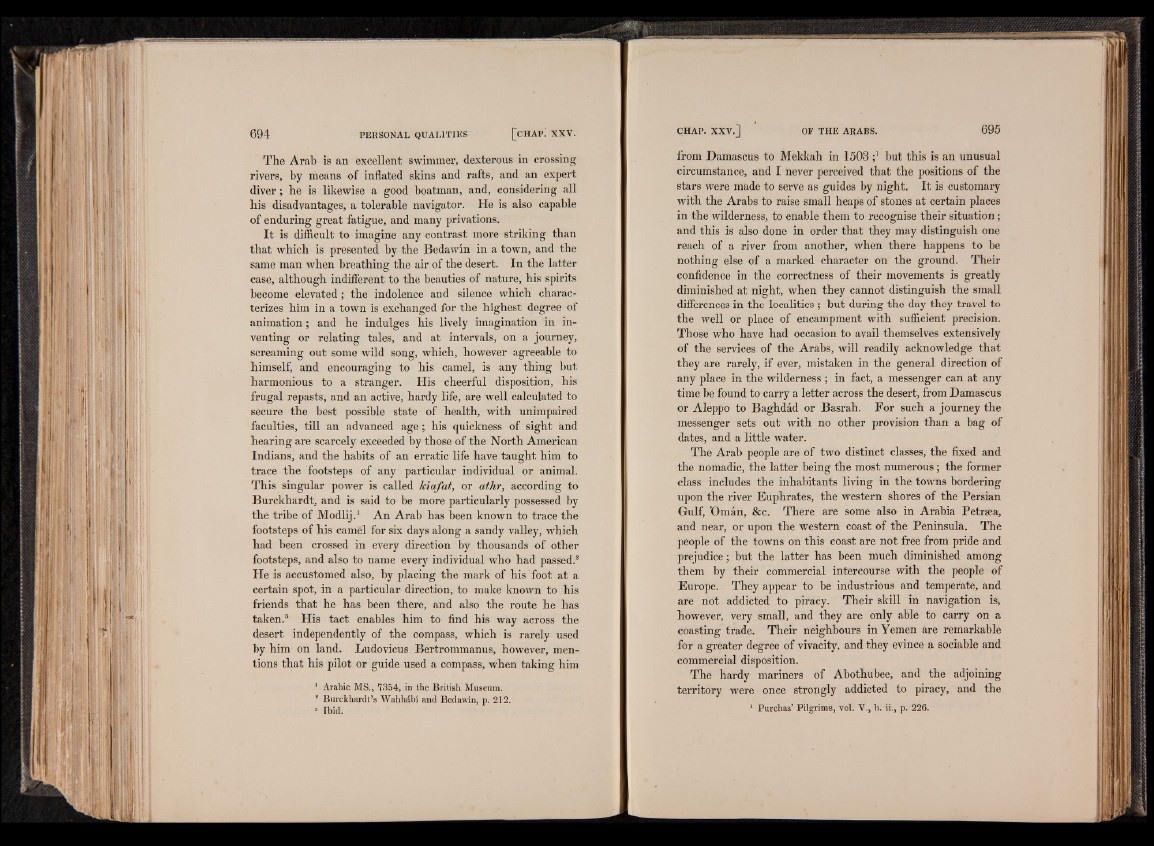
The Arab is an excellent swimmer, dexterous in crossing
rivers, by means of inflated skins and rafts, and an expert
diver; he is likewise a good boatman, and, considering all
his disadvantages, a tolerable navigator. He is also capable
of enduring great fatigue, and many privations.
It is difficult to imagine any contrast more striking than
that which is presented by the Bedawin in a town, and the
same man when breathing the air of the desert. In the latter
case, although indifferent to the beauties of nature, his spirits
become elevated; the indolence and silence which characterizes
him in a town is exchanged for the highest degree of
animation; and he indulges his lively imagination in inventing
or relating tales, and at intervals, on a journey,
screaming out some wild song, which, however agreeable to
himself, and encouraging to his camel, is any thing but
harmonious to a stranger. His cheerful disposition, his
frugal repasts, and an active, hardy life, are well calculated to
secure the best possible state of health, with unimpaired
faculties, till an advanced age; his quickness of sight and
hearing are scarcely exceeded by those of the North American
Indians, and the habits of an erratic life have taught him to
trace the footsteps of any particular individual or animal.
This singular power is called kiafat, or athr, according to
Burckhardt, and is said to be more particularly possessed by
the tribe of Modlij.1 An Arab has been known to trace the
footsteps of his camel for six days along a sandy valley, which
had been crossed in every direction by thousands of other
footsteps, and also to name every individual who had passed.2
He is accustomed also, by placing the mark of his foot at a
certain spot, in a particular direction, to make known to his
friends that he has been there, and also the route he has
taken.3 His tact enables him to find his way across the
desert independently of the compass, which is rarely used
by him on land. Ludovicus Bertrommanus, however, mentions
that his pilot or guide used a compass, when taking him
1 Arabic MS., 7354, in the British Museum.
* Burckhardt’s Wahhdbi and Bedawin, p. 212.
3 Ibid.
from Damascus to Mekkah in 1503 but this is an unusual
circumstance, and I never perceived that the positions of the
stars were made to serve as guides by night. It is customary
with the Arabs to raise small heaps of stones at certain places
in the wilderness, to enable them to recognise their situation;
and this is also done in order that they may distinguish one
reach of a river from another, when there happens to be
nothing else of a marked character on the ground. Their
confidence in the correctness of their movements is greatly
diminished at night, when they cannot distinguish the small
differences in the localities ; but during the day they travel to
the well or place of encampment with sufficient precision.
Those who have had occasion to avail themselves extensively
of the services of the Arabs, will readily acknowledge that
they are rarely, if ever, mistaken in the general direction of
any place in the wilderness ; in fact, a messenger can at any
time be found to carry a letter across the desert, from Damascus
or Aleppo to Baghdad or Basrah. For such a journey the
messenger sets out with no other provision than a bag of
dates, and a little water.
The Arab people are of two distinct classes, the fixed and
the nomadic, the latter being the most numerous; the former
class includes the inhabitants living in the towns bordering
upon the river Euphrates, the western shores of the Persian
Gulf, ’Oman, &c. There are some also in Arabia Petrsea,
and near, or upon the western coast of the Peninsula. The
people of the towns on this coast are not free from pride and
prejudice; but the latter has been much diminished among
them by their commercial intercourse with the people of
Europe. They appear to be industrious and temperate, and
are not addicted to piracy. Their skill in navigation is,
however, very small, and they are only able to carry on a
coasting trade. Their neighbours in Yemen, are remarkable
for a greater degree of vivacity, and they evince a sociable and
commercial disposition.
The hardy mariners of Abothubee, and the adjoining
territory were once strongly addicted to piracy, and the
1 Purchas’ Pilgrims, vol. V., b. ii., p. 226.